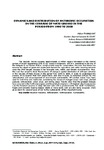Use este identificador para citar ou linkar para este item:
http://www.alice.cnptia.embrapa.br/alice/handle/doc/972187Registro completo de metadados
| Campo DC | Valor | Idioma |
|---|---|---|
| dc.contributor.author | TRABAQUINI, K. | pt_BR |
| dc.contributor.author | SILVA, G. B. S. da | pt_BR |
| dc.contributor.author | FORMAGGIO, A. R. | pt_BR |
| dc.contributor.author | SHIMABUKURO, Y. E. | pt_BR |
| dc.contributor.author | GALVÃO, L. S. | pt_BR |
| dc.date.accessioned | 2013-11-26T11:11:11Z | pt_BR |
| dc.date.available | 2013-11-26T11:11:11Z | pt_BR |
| dc.date.created | 2013-11-26 | pt_BR |
| dc.date.issued | 2013 | pt_BR |
| dc.identifier.citation | Geografia, Rio Claro, v. 38, n. 2, p. 209-224, maio/ago. 2013. | pt_BR |
| dc.identifier.isbn | 01007912 | pt_BR |
| dc.identifier.uri | http://www.alice.cnptia.embrapa.br/alice/handle/doc/972187 | pt_BR |
| dc.description | The Cerrado biome occupies approximately 2 million square kilometers in the Central portion of Brazil representing 23% of our country’s extension, and it is considered to be one of the hotspots in our Planet, that is, a high-priority area for conservation. However, this biome has become the object of great and accelerated demand for agriculture and cattle ranching activities since the 1970 decade, because it has favorable soils, reliefs, and climatic characteristics. Thus, this work has aimed to study the dynamics of change in spatial distribution of anthropic activities in the Cerrado of Mato Grosso in the period from 1990 to 2008, in order to understand the process of occupation that took place there, and also in order to subsidize policies for the rationalization and encouragement of environment sustainability. 28 Landsat scenes have been used for both time cuts mentioned, considering the classes of changed areas: cash crops, planted pastures, reforestation, urban areas, and mining areas. Results show that the greatest changes have occurred in the North mesoregion; and the phytophysiognomy with highest rate of suppression was the forested savanna in deep latossoil soils with a predominantly flat relief. Nonetheless, fragile environments (having steeper reliefs or more sandy soil) are also being occupied, which gives alarm for several types of risk to the sustainability of this important biome. | pt_BR |
| dc.language.iso | por | pt_BR |
| dc.rights | openAccess | pt_BR |
| dc.subject | Anthropization | pt_BR |
| dc.subject | Brazilian Savanna | pt_BR |
| dc.subject | Sustainability | pt_BR |
| dc.title | Dynamics and distribution of anthropic occupation in the Cerrado of Mato Grosso in the period from 1990 to 2008. | pt_BR |
| dc.type | Artigo de periódico | pt_BR |
| dc.date.updated | 2013-11-26T11:11:11Z | pt_BR |
| dc.subject.nalthesaurus | Deforestation | pt_BR |
| dc.format.extent2 | p. 209-224 | pt_BR |
| riaa.ainfo.id | 972187 | pt_BR |
| riaa.ainfo.lastupdate | 2013-11-26 | pt_BR |
| dc.contributor.institution | KLEBER TRABAQUINI, INPE; GUSTAVO BAYMA SIQUEIRA DA SILVA, CNPM; ANTONIO ROBERTO FORMAGGIO, INPE; YOSIO EDEMIR SHIMABUKURO, INPE; LÊNIO SOARES GALVÃO, INPE. | pt_BR |
| Aparece nas coleções: | Artigo em periódico indexado (CNPM)  | |
Arquivos associados a este item:
| Arquivo | Descrição | Tamanho | Formato | |
|---|---|---|---|---|
| 2013dynamicsanddistributionofanthropicoccupationintheCerradoofMatoGrossointheperiodfrom1990to2008.pdf | 2,77 MB | Adobe PDF |  Visualizar/Abrir |









